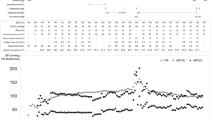Abstract
Introduction: Propofol infusion syndrome is described in the pediatric literature as metabolic acidosis, rhabdomyolysis, and bradycardia that results in death. The pathogenesis of this syndrome is thought to be activation of the systemic inflammatory response, which culminates in acidosis and muscle necrosis.
Materials and Methods: Retrospective chart review of three patients in the Neurological Critical Care Units at Hahnemann and Massachusetts General Hospitals between October 2001 and September 2004.
Results: Patient 1: A 27-year-old woman had seizures secondary to hemorrhage from an arteriovenous malformation. Propofol coma was induced for sedation. After initiation of propofol, she developed a metabolic acidosis, hypotension, and bradycardia and expired. Patient 2: A 64-year-old man presented in status epilepticus. After prolonged propofol administration, he developed metabolic acidosis, hypotension, and rhabdomyolysis and expired. Patient 3: A 24-year-old woman presented in status epilepticus secondary to encephalitis. Propofol was added for seizure control. She developed hypotension, metabolic acidosis, and bradyarrhythmias. Despite transvenous pacing, she expired.
Conclusion: These data show an association between extended propofol use and metabolic acidosis, rhabdomyolysis, and death in adults, as well as children. Risk factors for propofol infusion syndrome in adults include lean body mass index, high dose, and administration of more than 24-hour duration. Creatine phosphokinase, lactic acid levels, electrolytes, and arterial blood gases should be monitored frequently. Both bacterial and fungal cultures should be obtained. If this syndrome is suspected, hemodialysis should be considered. In fatal cases, autopsy should include electron microscopy of cardiac and skeletal muscle to look for mitochondrial dysfunction. Further study is warranted.
Similar content being viewed by others
References
Parke TJ, Stevens JE, Rice ASC, et al. Metabolic acidosis and fatal myocardial failure after propofol infusion in children: five case reports. BMJ 1992;305:613–617.
Bray RJ. Propofolinfusion syndrome in children. Paediatr Anaesth 1998;8:491–499.
Cannon ML, Glazier SS, Bauman LA. Metabolic acidosis, rhabdomyolysis, and cardiovascular collapse after prolonged propofol infusion. J Neurosurg 2001;95:1053–1056.
Parke TJ, Stevens JE, Rice ASC, et al. Metabolic acidosis and fatal myocardial failure after propofol infusion in children: five case reports. BMJ 1992;305:613–617.
Strickland RA, Murray MJ. Fatal metabolic acidosis in a pediatric patient receiving an infusion of propofol in the intensive care unit: is there a relationship? Crit Care Med 1995;23:405–409.
Cray SH, Robinson BH, Cox PN. Lactic academia and bradyarrhythmia in a child sedated with propofol. Crit Care Med 1998;26:2087–2092.
Hanna JP, Ramundo ML. Rhabdomyolysis and hypoxia associated with prolonged propofol infusion in children. Neurology 1998;50:301–303.
Wolf A, Weir P, Segar P, Stone J, Shield J. Impaired fatty acid oxidation in propofol infusion syndrome. Lancet 2001;357:606.
Abrahams JM, Reiter GT, Acker MA. Propofol. J Neurosurg 2002;96:1160–1161.
Cremer OL, Moons KGM, Bouman EAC, Kruijwijk JE, de Smet AGA, Kalkman CJ. Long term propofol infusion and cardiac failure in adult head injured patients. Lancet 2001;357:117–118.
Perrier ND, Baerga-Varela Y, Murray MJ. Death related to propofol use in an adult patient. Crit Care Med 2000;28:3071–3074.
Friedman JA, Manno E, Fulgham JR. Propofol. J Neurosurg 2002;96:1161–1162.
Menon DK, Matta BF, Gupta AK, Swami A. Propofol use in head injury patients. Lancet 2001;357:858–859.
Kelly DF. Propofol infusion syndrome. J Neurosurg 2001;95:925–926.
Culp KE, Augoustides JG, Ochroch AE, Miles BL. Clinical management of cardiogenic shock associated with prolonged propofol infusion. Anesth Analg 2004;99:221–226.
Rigby-Jones AE, Nolan JA, Priston MJ, Sneyd JR, Wolf AR. Pharmacokinetics of propofol infusions in critically ill neonates, infants, and children in an intensive care unit. Anesthesiology 2002;97:1393–1400.
Deutschmann CS, Harris AP, Fleischer LA. Changes in heart rate variability under propofol anesthesia: a possible explanation for propofol-induced bradycardia. Anesth Analg 1994;79:373–377.
Zhou W, Fontenot HS, Wang SN, Kennedy RM. Propofol induced alterations in myocardial beta-adrenergic receptor binding and responsiveness. Anesth Analg 1999;89:604–608.
Vasile B, Rasulo F, Candiani A, Latronico N. The pathophysiology of propofol infusion syndrome: a simple name for a complex syndrome. Intensive Care Med 2003;29:1417–1425.
Author information
Authors and Affiliations
Corresponding author
Rights and permissions
About this article
Cite this article
Kumar, M.A., Urrutia, V.C., Thomas, C.E. et al. The syndrome of irreversible acidosis after prolonged propofol infusion. Neurocrit Care 3, 257–259 (2005). https://doi.org/10.1385/NCC:3:3:257
Issue Date:
DOI: https://doi.org/10.1385/NCC:3:3:257



